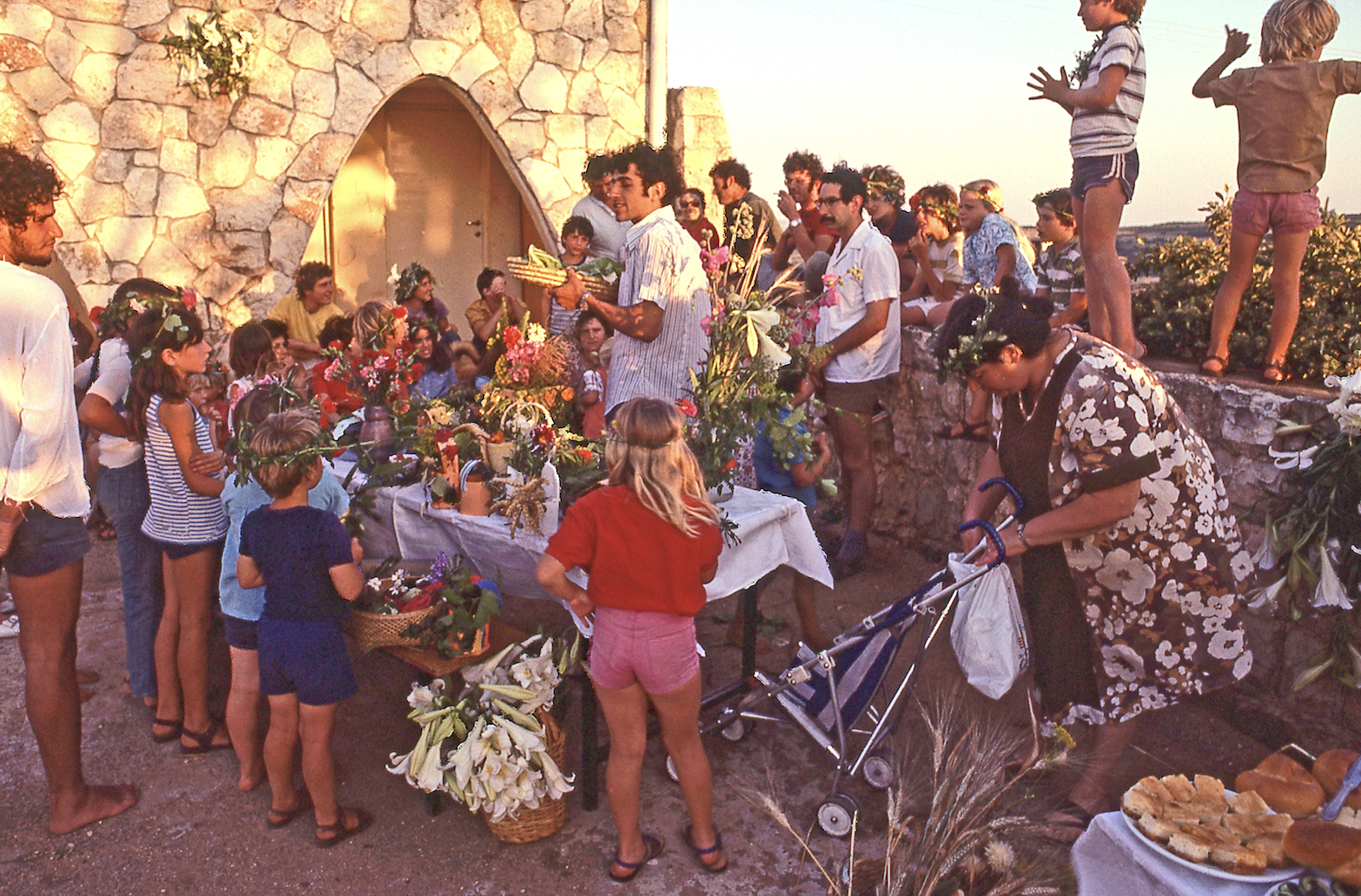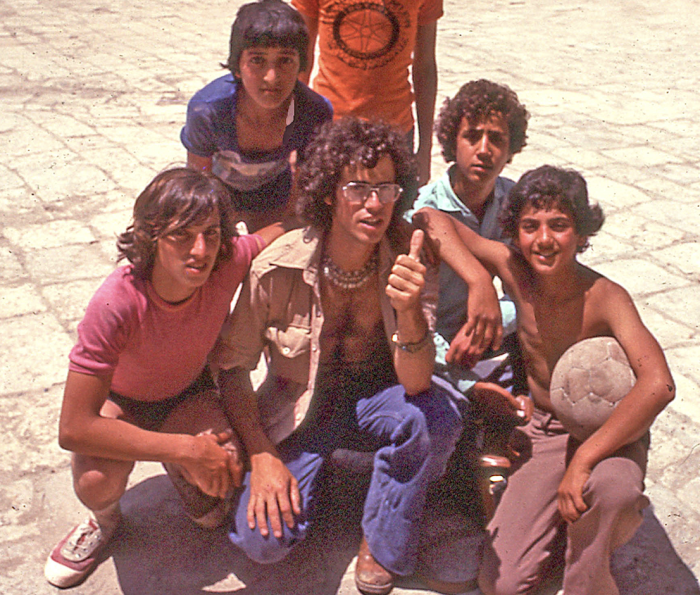(The author playing soccer with a group of Israeli-Palestinian kids in Acco)
~
{*Did you know you can write on Elephant? Here’s how—big changes: How to Write & Make Money or at least Be of Benefit on Elephant. ~ Waylon}
~
Israel is one of the few nations on Earth whose very name incites volatile emotions, especially now.
This tiny land with its oversized and, at times, overwhelming history will always be either glorified or vilified. But as any seasoned traveler knows, spending time on the ground in another country can tell you more about it than all the headlines, guidebooks, and travel magazines you read beforehand.
Because I was raised Jewish in the 1950s and 60s, Israel was a mystical presence in my life, a land we acknowledged every holiday or viewed in heroic movies like “Exodus.” (Paul Newman’s blue eyes helped.) During the Six-Day War, I would have joined the Israel Defense Forces but was too young.
My ardor dimmed as the trials of early adulthood intervened but when offered the opportunity to visit in May 1977, I didn’t hesitate.
My first encounter with this unique country occurred at an event at a New York City synagogue a week before my departure. There, I met an 11-year-old Israeli boy.
“Hello,” he said with a bright smile. “My name is Raffi. I’ve lived through three wars.” Needless to say, I was taken aback by his introduction. As a rule, American kids don’t define themselves by the number of wars they’ve survived. I had lived through the Korean War and Vietnam but his response highlighted the different ways Raffi and I viewed warfare.
I reflected on the fact that we Americans fought our wars thousands of miles away. And even if we theoretically “lost,” none of our cities, towns, or villages were destroyed. The population of the United States wasn’t massacred and infrastructures weren’t reduced to rubble.
For Raffi, war meant rockets and artillery shells landing in his front yard while enemy forces massed on the border mere miles away. Defeat meant being wiped off the face of the earth, a second Holocaust. I had read that on the eve of the Six-Day War, rabbis had consecrated public parks in major Israeli cities as potential mass burial sites.

(A meat seller at Tel Aviv’s Carmel Market)
In 1977, Israel was still in a state of war with its Arab neighbors and for three decades had endured terrorist attacks taking place in schools, markets, theaters, restaurants, and on public transportation. Americans like me were blissfully naïve about such threats. I learned a harsh lesson soon after my arrival when I left my luggage on the sidewalk outside a restaurant only to return and find two strangers going through my bags. They cut through my protest with a blistering warning to never leave bags unintended because they usually contained a bomb.
A week later, I was sitting in the Tel Aviv bus terminal when another set of unattended suitcases was discovered. The electric wave of panic that immediately flooded the passengers (including myself) is something I will never forget. Luckily, the bags belonged to another dumb American tourist (like me.)
My visit, however, was more than just war and terror. Israel in 1977 was a funky, swarthy, Middle Eastern country shaped by its harsh desert landscape. My Sabra (native-born Israeli) friends’ idea of fun was to go for a jolly 15-mile hike in the blazing sun or jump off a 60-foot cliff into a small body of water—I did both.
The Israelis were crude, boisterous, and chatted so loudly that sitting in a café, I could barely hear myself think, a safety-valve perhaps for the relentless tension. Soldiers were everywhere and at times I felt I was residing on a huge army base. They were all traveling hither and yon, carrying their M-16s (without magazines inserted.) I was bonked on the head more than once by one while getting on or off the bus.
But the crudity was more than alleviated by the warmth and friendliness of the people. I arrived in Israel for a six-week stay with absolutely no itinerary. But after a one-week truck tour into the Sinai Desert (then occupied by Israel), I was invited over the following month to visit my newly-made pals throughout the country. I stayed at kibbutzim, moshavs (a less communal farming community), and youth hostels; shared meals with travelers from Australia, Zimbabwe, Ireland, and France, and ate some of the healthiest meals of my life, especially breakfast spreads heaped with fresh fruits and vegetables.
Back then, every street-corner hosted a falafel stand where you could buy a pita stuffed with falafels, tomatoes, lettuce, and cabbage for a mere 50 cents. In Old Jerusalem, the restaurant “Uncle Moustache” offered youthful travelers like me a full chicken dinner for a few bucks.

(A kibbutz holiday festival)
I met Palestinian-Israelis who were distraught by the cultural differences between them and their Jewish neighbors as well as those who sincerely wanted a mutual understanding. One Palestinian man who gave me a ride up to Haifa said to me, “Tell the Israelis we will not eat them.” In response, I hoped that Israeli and Palestinian children would be raised not to fear each other. Naïve, perhaps, but at the time, it seemed a rational solution.
On my way to the airport for my flight back to New York, I passed a junkyard with a crane dropping demolished automobiles atop each other. My initial reaction was “Wow, they did it. They actually created a real country!” In my mind, any entity that accumulated junk qualified as a viable nation.
Needless to say, Israel, like all states, has changed drastically over the decades since my sojourn and will probably remain a land where nobody, of whatever ethnicity, ever feels at peace. It’s a tragedy for all involved. But I’m grateful to have been there.
To travel is to interact with a culture before it either disappears or mutates into something unrecognizable. Underneath the slogans and the banners, the newscasts and the punditry, however, are real people trying to live their lives and it’s important that we recognize and honor their humanity as we would have them do for ourselves.
~
{Please consider Boosting our authors’ articles in their first week to help them win Elephant’s Ecosystem so they can get paid and write more.}
~


 Share on bsky
Share on bsky





Read 3 comments and reply